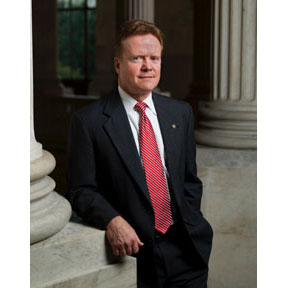
Sen. Webb, chairman of the Senate Foreign Relations East Asian and Pacific Affairs Subcommittee, was joined in his letter to Secretary of State Hillary Clinton by subcommittee ranking member James Inhofe.
“This letter is the result of years of thought and effort, and I am confident that lifting economic sanctions is the best course of action,” commented Sen. Webb. “The President has the power to do that. It’s time for him to act.”
In 2009, Sen. Webb was the first American leader to visit Burma in more than 10 years, and remains the only American official ever to meet with General Than Shwe, the former leader of the country’s former military regime. During that visit, Senator Webb also met with Thein Sein, who now serves as President, and Aung San Suu Kyi, who at that time remained under house arrest. Sen. Webb made his third visit to Burma in April, shortly after that country’s national parliamentary by-elections. He then chaired a subcommittee hearing on April 26, 2012, with senior officials from the Departments of Treasury and State and USAID, as well as outside experts, to provide a clearer understanding of the range of sanctions in place and the obstacles to removing them.
“At this critical moment, it is imperative that our policy toward Burma be forward thinking, providing incentives for further reforms and building the capacity of reformers in the government to push for additional change,” Sen. Webb, joined by Sen. Inhofe, wrote. “We urge the Administration to take action under its own authority, and seize this opportunity to support the Burmese people in their efforts to form an open, democratic government that respects and protects the rights of all.”
In response to questions raised at the April 26 subcommittee hearing, Office of Foreign Assets Control Director Adam Szubin testified that the main categories of sanctions imposed by statute or executive order can be lifted by the President via licenses, rescission of executive orders, or issuance of waivers on national security. He noted that executive decisions to remove sanctions can still target and blacklist the assets or activities of specific “bad actors” from the previous military junta so that they will not benefit from economic relations with the United States.
In their joint letter, the senators warned against lifting sanctions sector by sector, noting that retaining sanctions on individual industries such as petroleum would be “a strategic mistake. The United States should not be picking winners and losers in our economic engagement abroad, but rather should be encouraging the business community as a whole to take on the risk of investing in human development in Burma. Their involvement can foster an open, transparent business environment that supports the rule of law and a level playing field for foreign investment.”
“Progress in Burma toward the goals we all share—greater freedom and prosperity for the people of Burma—is ultimately tied to the sanctions that are in place,” wrote the senators. “Unlike some other countries in the region, most notably China and Vietnam, Burma’s new leadership has moved forward with political change ahead of economic change. It is important to note that Daw Aung San Suu Kyi herself, speaking as an elected representative of the government of Burma, publicly announced her support for the EU’s decision to suspend sanctions in response to democratic reforms in the country. The process of reform in Burma is still far from complete, but the positive steps that have been taken should be met with a positive response from our own government.”










